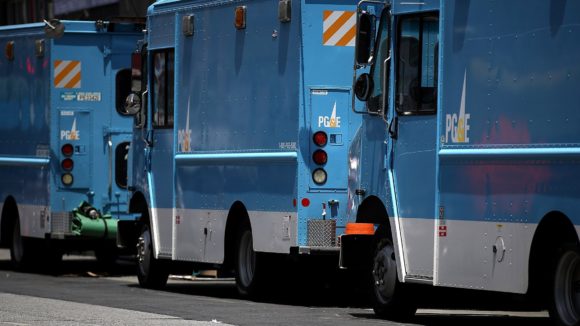The power generators that supply bankrupt utility giant PG&E Corp. were dealt a major blow as a judge ruled that federal regulators can’t keep their supply contracts from getting killed.
Power giants including NextEra Energy Inc. and Exelon Corp. had enlisted the help of the Federal Energy Regulatory Commission in ensuring their long-term contracts with PG&E survive the biggest utility bankruptcy in U.S. history. But Dennis Montali, the judge overseeing PG&E’s case in San Francisco, decided on Friday that the commission doesn’t have the jurisdiction that it has asserted it does.
The ruling could set up heavy losses for generators who have $42 billion worth of long-term agreements with PG&E, should those deals get tossed by Montali. The fate of these contracts has been thrown into question as the utility grapples with an estimated $30 billion worth of liabilities tied to wildfires its equipment may have ignited. The mere prospect of the contracts getting killed has already rattled the power industry, which relies on long-term agreements like these to attract financing for capital-intensive projects.
In presuming to have “concurrent” jurisdiction over the contracts, the federal energy commission “has and continues to have the effect of undermining the function of the bankruptcy court,” Montali said in a scathing, 31-page judgment. “FERC must be stopped and the division and balance of power and authority of the two branches of government restored.”
Montali went on to warn that, if necessary, the court will “enjoin FERC from perpetuating its attempt to exercise power it wholly lacks.” The federal energy commission declined to comment, saying it doesn’t discuss court rulings.
PG&E has yet to say whether it’ll move to have the agreements thrown out. So far, the company has only asked Montali to block its power suppliers from invoking court-like proceedings before the energy commission. It argued that, so long as its Chapter 11 case pending, only a bankruptcy judge should have a say on the contracts.
The shares slipped 4.1% to $19.62 at 10:20 a.m. in New York.
Stakeholder Concerns
The company said by email Saturday that, while it’s “pleased” with the court’s decision, it also appreciates the concerns of stakeholders in California about how its bankruptcy could affect the state’s goals of sourcing more power from clean energy resources. It said input from the court, policymakers, regulators and other stakeholders will be “critical” in determining a path forward.
The decision is likely to be appealed, according to Greg Gordon, an analyst with Evercore ISI. Even if it’s upheld, it’s not certain that rejecting contracts would benefit shareholders because the agreements would “become claims in the bankruptcy proceedings,” he wrote in a research note Monday.
NextEra declined to comment. Exelon said it is monitoring the bankruptcy proceeding.
Should PG&E try to get the pacts thrown out, Montali’s ruling may increase its chances of success. The company’s suppliers noted in filings that, while bankruptcy courts have historically focused most on improving the finances of insolvent companies, the energy commission would’ve had to consider the impacts to power markets as a whole.
Montali said in his ruling that “nothing will happen” until a move is made to reject one of the long-term contracts. “At that time the court will consider the merits of any such motion and if consideration implicates public policy interests as well as reorganization goals,” he said.
Under the bankruptcy code, PG&E’s power generators have the right to argue that their contracts should remain in place. If they’re canceled instead, any penalties would probably be considered unsecured claims that the utility would have to pay, if it can.
–With assistance from Steven Church and Will Wade.
Was this article valuable?
Here are more articles you may enjoy.


 UBS Top Executives to Appear at Senate Hearing on Credit Suisse Nazi Accounts
UBS Top Executives to Appear at Senate Hearing on Credit Suisse Nazi Accounts  Uber Jury Awards $8.5 Million Damages in Sexual Assault Case
Uber Jury Awards $8.5 Million Damages in Sexual Assault Case  Credit Suisse Nazi Probe Reveals Fresh SS Ties, Senator Says
Credit Suisse Nazi Probe Reveals Fresh SS Ties, Senator Says  China Bans Hidden Car Door Handles in World-First Safety Policy
China Bans Hidden Car Door Handles in World-First Safety Policy 